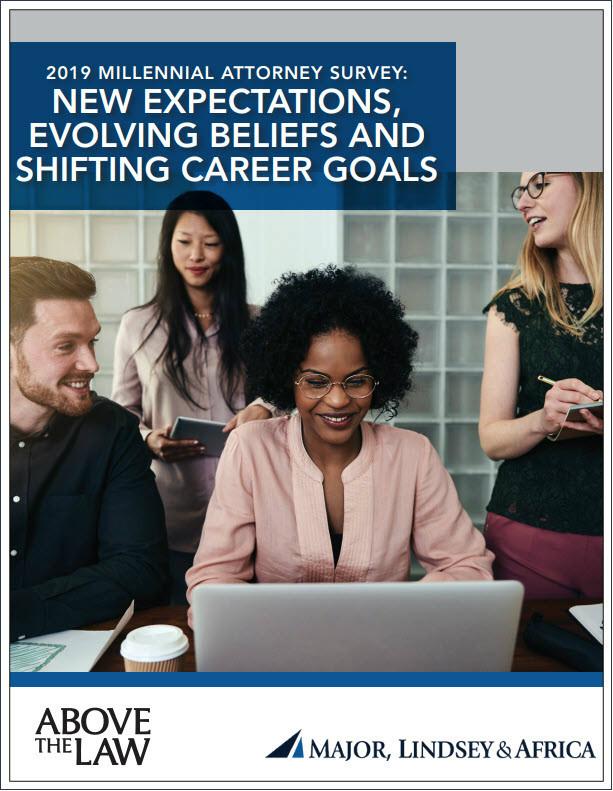Much of this article is taken from a more comprehensive AI eBook. Click here to view it.
Efficient learning from experience
 Attorneys at small law firms can gain a lot of hands-on experience and practical exposure to legal issues and cases that they might not get at a larger law firm. But when they ask around the firm for answers and guidance, they typically won’t find the breadth of experience and advice on how to handle some issues that they would find at a large law firm. It’s simply a matter of a smaller pool of resources to draw from.
Attorneys at small law firms can gain a lot of hands-on experience and practical exposure to legal issues and cases that they might not get at a larger law firm. But when they ask around the firm for answers and guidance, they typically won’t find the breadth of experience and advice on how to handle some issues that they would find at a large law firm. It’s simply a matter of a smaller pool of resources to draw from.
Usually, small law firm attorneys who find themselves in unfamiliar legal territory would increase their research efforts, often with unbilled time, and go to greater lengths (and stress levels) to compensate for their lack of experience and confidence with the legal matter.
Sure, it’s a learning experience and will help the attorney be even more prepared for the next time they face a similar issue or case, but it’s not a sustainable or profitable way to practice law. And would clients want to know that they’re paying for their lawyer’s learning experience for the benefit of the next client’s representation? Not likely.
So, what can a small law firm attorney do to gain the insights of large law firms and more experienced attorneys? The answer is artificial intelligence.
Find and follow proven paths to success
As we discuss in our eBook, “Not All Legal AI Is Created Equal,” good legal AI solutions are built on legal expertise, quality data, and AI expertise. These three essential components are like three legs of a tripod and they aren’t static – artificial intelligence, like human intelligence, is constantly learning, becoming more “intelligent” with new information and interaction with users. The more experience and insight the users have, the more they impart on the AI system.
With Westlaw, that means thousands of experienced users at the biggest, most prestigious law firms and the most specialized, boutique law firms are helping to create a more intelligent and useful system. The paths their research takes, the documents they gather, and the legal strategies they pursue are aggregated with those of other users for AI technologies, such as machine learning, to analyze and form connections. Then, the system takes what it’s learned from the legal research your peers have done to anticipate and meet your needs. This means Westlaw is working ahead, gathering relevant case citations while you research statutes, or listing useful forms while you compile secondary sources.
The result is that you’re getting guidance and strategy from thousands of attorneys who have used Westlaw to overcome the same issues you face, rather than one or two lawyers in your firm.
Ask AI what you would ask another attorney
Of course, not every answer can be found in blackletter law, case citations, or headnotes. Sometimes you want to know how to account for the human variables of your legal strategy. No, AI-enabled solutions can’t read the minds of opposing counsel or the judge presiding over your case (yet), but they can tell you whether the strategies you’re considering have worked in the past with similar cases.
In a large firm, you might be able to ask a fellow attorney who has experience with a similar case before the same judge you’re facing, “How does Judge X respond to strategy Y?” In a small firm, you could still learn from the experiences of large law firm lawyers by asking the same question of an AI-enabled solution and get a more accurate answer.
Are you considering a particular motion? Don’t file and hope for the best – find out how the judge for your case has responded to similar motions with other cases. With quality data, AI technologies can provide analysis that tells you precisely how often a judge has denied similar motions in the past, down to the percentage, so you can adjust your strategy accordingly. Clients are more likely to trust your legal strategies and overlook limited practical experience if you can back them up with hard facts and statistical probabilities.
Conclusion
As the legal industry continues to become more competitive and clients continue to demand more for less, attorneys at small law firms are in a great position to succeed if they can provide the service and fees of a small firm, as well as the experience and effectiveness of a large firm. With the help of user-informed AI solutions such as Westlaw, it’s possible to provide experienced representation, even if the experience isn’t your own. The old saying still rings true: “It is far more efficient to learn from others’ experiences than our own.”
Learn more about what makes a good legal artificial intelligence solution by downloading our eBook, “Not All Legal AI Is Created Equal.”
***
 Dr. Tonya Custis is a Research Director at Thomson Reuters where she leads a team of research scientists performing applied research in Artificial Intelligence technologies. Tonya earned a Ph.D. in Linguistics, an M.S. in Computer Science, and an M.A. in Linguistics, all from the University of Minnesota. She also has a B.A. in Music from the University of Connecticut. Her research interests include information retrieval, natural language processing, and machine learning. She is currently leading projects that explore Question Answering and Natural Language Understanding in the Legal domain.
Dr. Tonya Custis is a Research Director at Thomson Reuters where she leads a team of research scientists performing applied research in Artificial Intelligence technologies. Tonya earned a Ph.D. in Linguistics, an M.S. in Computer Science, and an M.A. in Linguistics, all from the University of Minnesota. She also has a B.A. in Music from the University of Connecticut. Her research interests include information retrieval, natural language processing, and machine learning. She is currently leading projects that explore Question Answering and Natural Language Understanding in the Legal domain.















 Get a better starting point with attorney created legal documents, checklists, guides and more. »
Get a better starting point with attorney created legal documents, checklists, guides and more. » Gain a clear strategic advantage with the fastest answers and most valuable insights. »
Gain a clear strategic advantage with the fastest answers and most valuable insights. » Simplify your matter management, client communication and financial reporting in one seamless tool. »
Simplify your matter management, client communication and financial reporting in one seamless tool. »